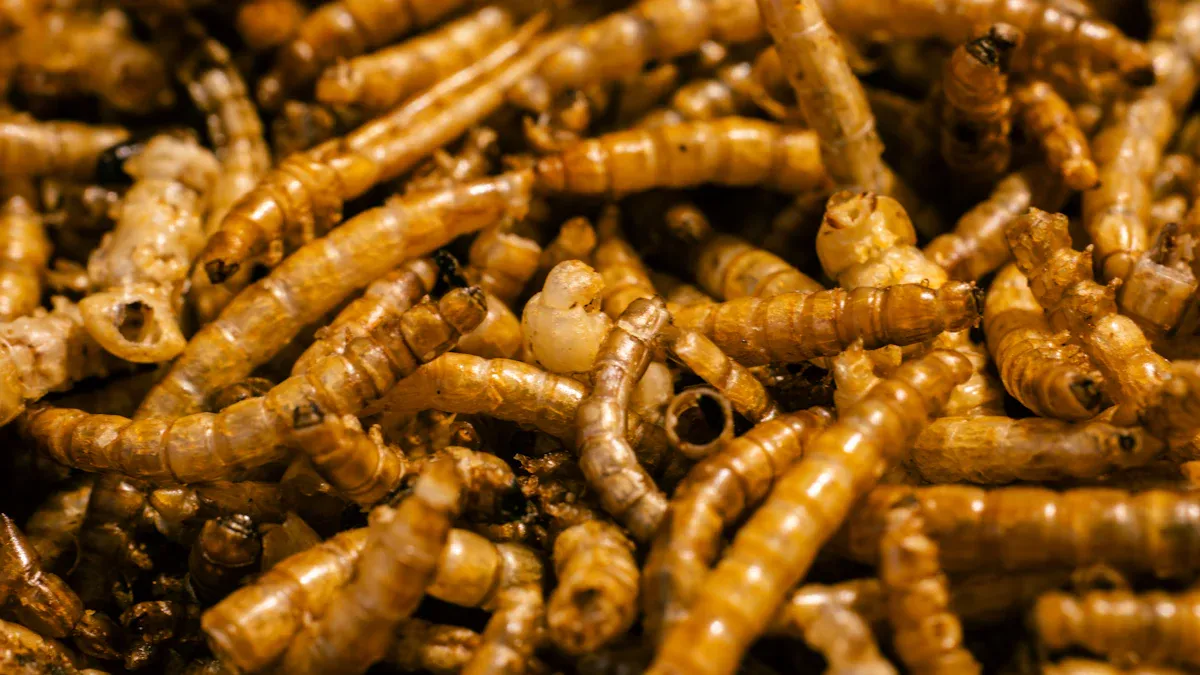
Pet food manufacturers are turning to pet food mealworm products for good reasons. These ingredients deliver exceptional nutrition, support sustainability, and ensure premium quality. Mealworms boast the highest protein content on the market at 71%, while their carbon footprint is significantly lower than traditional proteins like lamb or beef. This makes them a smart, eco-friendly choice for pet food mealworm formulations.
Key Takeaways
- Mealworms are a great protein source for pets. Their protein is as good as beef or salmon. This helps pets grow and stay healthy.
- Growing mealworms is better for the environment. It uses fewer resources and makes less CO2. This is a smart choice for eco-friendly pet owners.
- Careful checks make sure mealworm pet food is safe. It is easy to track and meets high health standards for pets.
Pet Food Mealworm Offers Exceptional Nutrition
High-Quality Protein Source
Mealworms are an excellent source of protein for pets. Studies show that mealworm ingredients have protein quality scores comparable to traditional sources like beef and salmon. For adult dogs, these scores range from 72% to 96%, while puppies benefit from scores as high as 87%. This makes mealworms a reliable alternative to animal proteins. Unlike many plant-based proteins, mealworms deliver a complete amino acid profile, ensuring pets get the nutrients they need for muscle growth and repair.
| Study Title | Findings |
|---|---|
| Digestibility of mealworms as pet food ingredients | Mealworm-based ingredients are high-quality protein sources, with further research needed for palatability and digestibility in dogs and cats. |
| Protein quality and complementarity of mealworm ingredients for pet food | Mealworm protein is competitive with traditional sources like rice and salmon, which have high protein quality scores. |
Packed with Essential Nutrients
Mealworms are more than just a protein source. They are packed with essential nutrients like omega-3 and omega-6 fatty acids, vitamins, and minerals. These nutrients support healthy skin, shiny coats, and strong bones. Unlike some traditional protein sources, mealworms also contain fewer allergens, making them suitable for pets with sensitive stomachs. Pet food manufacturers can rely on mealworms to create balanced diets that meet nutritional standards.
Promotes Overall Pet Health
Mealworm-based diets contribute to better overall health for pets. Clinical trials reveal that dogs fed mealworm diets maintain stable gastrointestinal health, ideal body condition, and excellent coat quality. Stool quality also scores an ideal 3, indicating well-formed and moist stools. Additionally, mealworm protein has shown anti-obesity effects in animal studies, reducing weight gain and liver fat in obese rodents. These findings highlight the potential of mealworms to support long-term pet health.
Mealworms are not just a trend—they are a scientifically backed solution for pet nutrition.
Pet Food Mealworm Supports Sustainability

Minimal Environmental Impact
Mealworm farming has a much smaller environmental footprint compared to traditional livestock production. Studies show that producing 1 kg of edible mealworm protein emits only 20.4 kg of CO2-eq, while organic broiler production emits up to 72% more. Mealworms also require less energy and land, using just 213.66 MJ-eq of energy and 22.38 m² of land per kilogram. This makes them a greener choice for pet food formulations. Additionally, mealworm-based products like Sprÿng’s Protein70 and WetPro15 have significantly lower carbon footprints than lamb or beef. For example, WetPro15 emits just 0.90 kg CO2-eq per kilogram, compared to 23.65 kg CO2-eq for lamb.
Efficient Use of Resources
Mealworms are incredibly resource-efficient. They thrive on agricultural by-products, reducing the need for additional feed. Unlike cattle, which require 8 kg of feed to produce 1 kg of protein, mealworms need only 1.7 kg. This efficiency extends to water and land use, making mealworms a sustainable alternative to traditional protein sources. Pet food manufacturers can rely on mealworms to create eco-friendly products without sacrificing quality.
Appeals to Eco-Conscious Consumers
Eco-conscious consumers are driving demand for sustainable pet food options. Mealworm products check all the boxes—they’re nutritious, environmentally friendly, and resource-efficient. Surveys reveal that these consumers value mealworm-based pet food for its low environmental impact and high-quality protein. By incorporating mealworms, manufacturers can align with consumer values and stand out in a competitive market.
Pet Food Mealworm Ensures Premium Quality
Rigorous Quality Standards
Mealworm-based pet food ingredients undergo strict quality control to ensure safety and consistency. Manufacturers implement rigorous safety standards and monitor the mealworms’ environment to maintain hygienic conditions. This attention to detail ensures that the final product meets high nutritional and safety benchmarks.
| Quality Control Aspect | Description |
|---|---|
| Safety Standards | Rigorous safety standards are implemented to ensure product safety and quality. |
| Environmental Control | Precise monitoring of the mealworms’ environment ensures consistent and hygienic conditions. |
| Nutritional Quality | Mealworms provide high protein content (71%) and essential nutrients for pet food. |
Studies confirm the safety of mealworm-based diets. In a six-month trial, dogs fed mealworm-based food showed no significant differences in food consumption compared to traditional diets. They maintained ideal body condition scores, stable stool quality, and excellent coat health. These findings highlight the reliability of mealworm products in meeting pet food quality standards.
Safe and Traceable Sourcing
Mealworm farming prioritizes transparency and safety. Advanced facilities, like the one in Amiens, France, use cutting-edge technology to monitor mealworm health and ensure compliance with safety regulations. This system tracks every step of the production process, generating billions of data points daily to guarantee traceability.
Indoor farming conditions further enhance safety by limiting contamination risks. Feedstock is carefully selected to minimize heavy metals, pesticides, and other harmful substances. A sanitary control plan ensures microbiological safety, making mealworm ingredients a trustworthy choice for pet food manufacturers.
Reliable Performance in Pet Food
Mealworm ingredients consistently deliver on their nutritional promises. They boast an ash content of less than 5% and are rich in unsaturated fatty acids, making them a premium protein source. Comparative studies show that mealworm-based diets meet or exceed the digestibility and nutritional adequacy of traditional proteins like salmon and beef.
Throughout a six-month study, dogs fed mealworm-based diets maintained stable gastrointestinal health, ideal body condition scores, and healthy coats. Stool quality remained optimal, and blood tests revealed no adverse changes in health parameters. These results demonstrate that mealworm products perform reliably in pet food formulations, offering both safety and nutrition.
Mealworm products stand out for their exceptional nutrition, sustainability, and premium quality. They offer high protein, fewer allergens, and a lower carbon footprint compared to traditional proteins like beef.
- Dogs fed mealworm diets maintain ideal body condition and stable health.
- Manufacturers can meet eco-conscious demands while delivering safe, high-quality pet food.
Mealworms are the future of pet nutrition—nutritious, sustainable, and reliable.
FAQ
What makes mealworms better than traditional protein sources?
Mealworms provide high-quality protein, essential nutrients, and a lower carbon footprint. They’re sustainable, nutritious, and ideal for eco-conscious pet owners.
Are mealworm-based pet foods safe for pets?
Yes, mealworm ingredients undergo strict quality checks. They’re safe, traceable, and free from harmful substances, making them a reliable choice for pet food formulations.
Can pets with allergies eat mealworm-based food?
Absolutely! Mealworms contain fewer allergens compared to traditional proteins. They’re a great option for pets with sensitive stomachs or food intolerances.
🐾 Tip: Always consult your vet before switching your pet’s diet to ensure it meets their specific needs.


